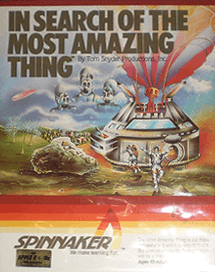In Search of the Most Amazing Thing
 Cover art | |
| Developer(s) | Tom Snyder Productions |
|---|---|
| Publisher(s) | Spinnaker Software |
| Platform(s) | Apple II, Atari 8-bit, Commodore 64, DOS |
| Release date(s) | 1983 |
| Genre(s) | Adventure |
| Mode(s) | Single-player |
In Search of the Most Amazing Thing (ISOTMAT) is a computer game designed by Tom Snyder Productions and published by Spinnaker Software in 1983. Although marketed as a children's game, ISOTMAT drew acclaim from players of all ages for its original concept and imaginative game world.
The game begins on a mysterious planet, Porquatz, with the androgynous player, Terry Bailey, exploring his/her subterranean home city by elevator. Terry's mysterious uncle, Smoke Bailey, has recently arrived in a strange craft known as the B-Liner, a hybridized all-terrain vehicle and hot-air balloon. Finding Smoke napping in his room, and waking him from his reverie with repeated shouts, Terry is tasked by Smoke to embark in the B-Liner on a quest for a lost artifact known only as "The Most Amazing Thing".
Navigating the world outside the city, known as the Mire, is a considerable challenge. Driving the B-Liner over the tar-like surface is easy, but leaves you open to being chased and temporarily paralyzed by Mire Crabs. To avoid these, the B-Liner can use its balloon to float above the Mire in unpowered flight, but this requires the player to carefully trim the B-Liner's altitude to take advantage of different wind currents prevailing at different altitudes, as well as monitoring fuel supply and navigating by dead reckoning.
To investigate notable objects in the Mire, the player can perform EVA using a personal jetpack. Encounters range from the benign Popberry trees, which provide food for the player, to the deadly Mire crabs, to the quizzical merchant aliens who provide Terry with vital clues and supplies for the quest. To trade with these aliens, the player must create Musix, a simple line-drawing translated by the game into a melody, which is then evaluated by the aliens according to their aesthetics, which vary according to the tribe they belong to. Due to their intrinsic shyness, the aliens communicate with the player entirely in a form of semaphore code, utilizing the only visible part of their anatomy: twin antennae, protruding coyly over the edge of the aliens' "desks".
Reception
Byte magazine called In Search of the Most Amazing Thing "an exciting adventure [and] a valuable educational tool", and added that it "clearly points out the versatility of the IBM PC as an educational tool, a recreational computer, and a business machine. I highly recommend this game".[1]
References
- ↑ Holden, Elaine (December 1983). "In Search of the Most Amazing Thing". BYTE. p. 372. Retrieved 20 October 2013.